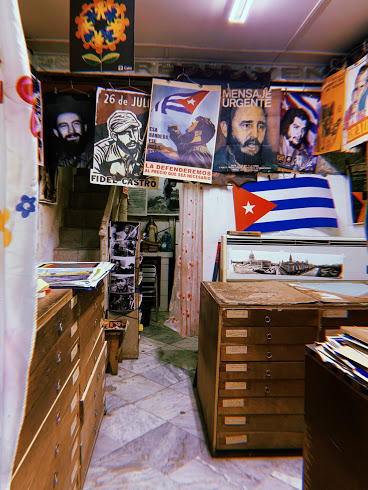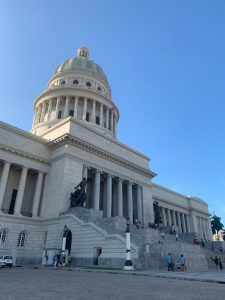

When I landed in Havana and was finally able to leave José Martí International Airport after making my way through customs and security, the first thing I noticed was the remarkable beauty of the city — and the stench of gasoline.
Cuba, I would find, is filled with contradictions such as this one; every question I had about Cuba was answered in two or more ways. This past winter break, I had the incredible opportunity to study abroad in Cuba. It was the first time someone in my immediate family has been to Cuba since 1955.
Cuban-Americans are unique in almost every way from other immigrant communities, and especially from other Latino communities. To various degrees, the Cuba-America embargo has isolated Cuban-Americans from their island. Despite the isolation, lots of Cuban-Americans, especially those who arrived in America in the early 1960s (majority white and upper middle-class), were treated far more favorably by the American government than other immigrant groups. Because of this, Cuban-Americans have a unique and somewhat estranged transnational identity (transnational identity being an immigrant or descendant of immigrants’ relationship to the “home country”).
This realization struck me dead in the face when I arrived in Cuba. My entire life I told people I am Cuban, but in Cuba I felt like the farthest thing from a Cuban. I embarked on this trip as sort of a return, hoping to find familiarity and the origins of my culture, and while I did find some of that, I found more complexity to my idea of Cuba than I was expecting. Like many other second-generation Americans, I am disconnected from my forefathers’ ways of life and comfortably assimilated into American culture. My ideas of Cuba originated from what my grandparents and parents told me and what I saw in popular media, rather than experiencing the place for itself.
For a Latin American country in the Caribbean, Cuba has a level of notoriety that is unprecedented. Most people have some idea about the politics and systems of government there and most have an opinion. This deeply shaped my identity as a Cuban growing up, but witnessing socialism in Cuba is more complex than people imagine. While talking to Cubans, I heard a wide range of opinions on the government. Some people were anti-Castro and anti-revolution, while others proclaimed their love of Castro and hatred towards the United States.
Cuba is an extremely progressive country in some ways: universal healthcare, legal abortion upon request since 1965, and free education from preschool to university, among many other things. But Cuba is behind in some areas as well: crumbling housing that the government is slow to restore, sexual harassment towards women (that I experienced first-hand), and repression of free speech. These contradictions make it impossible to pin down Cuba to a single adjective. With that, it was also impossible for me to piece together my Cuban identity from what I experienced in Cuba–– and I am fine with that now. When my family left Cuba during Fulgencio Batista’s rule, it was a very different country. My culture is based on what they remembered of Cuba, not what Cuba is today.
The study abroad program I went on was hosted by John Jay College, and any CUNY student can register with an e-permit. Our instructor was Professor Lisandro Pérez of the Latinx studies department of John Jay.
